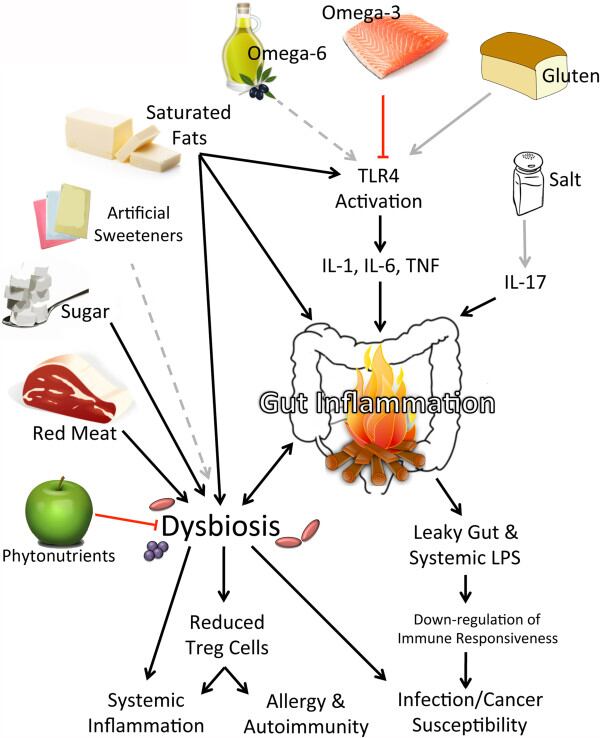Besides affecting immune functions and our own health, modern diets could also ‘code’ our DNA and gut bacteria to pass on poor immune functions to our children.
The stark warnings come in a review published in Nutrition Journal, which analysed the impact that the modern Western diet has on immune function and risk of ill-health related to poor immunity and inflammation.
Led by Dr Ian Myles from the National Institute of Allergy and Infectious Diseases at the US National Institutes of Health (NIH), the review analyses the scientific evidence for the impacts and mechanisms of harm for our over-indulgence in sugar, salt, and fat - as well as the data outlining the impacts of artificial sweeteners, gluten, and genetically modified foods.
“While today’s modern diet may provide beneficial protection from micro- and macronutrient deficiencies, our over abundance of calories and the macronutrients that compose our diet may all lead to increased inflammation, reduced control of infection, increased rates of cancer, and increased risk for allergic and auto-inflammatory disease,” warned Myles in his review.
“In summary, there is enough quality, direct human evidence to conclude that many of the dietary choices in today’s modern society appear to have harmful impacts on our immune system and likely on the immune system of our offspring,” he said, adding that modern ‘solutions’ to the negative impacts of poor diet including probiotics and dietary supplements will cannot do enough to counterbalance the damage done - without additional lifestyle changes.
“Of potentially greatest concern, our poor dietary behaviours are encoded into both our DNA scaffolding and gut microbiome, and thus these harmful immune modifications are passed to our offspring during their most critical developmental window,” he warned.
The ‘Western diet’

The modern Western diet is characterised by a high intake of saturated and omega-6 fatty acids, reduced omega-3 fat intake, an overuse of salt, and high intakes of carbohydrates and refined sugars.
“Most are aware that this type of eating, if not in moderation, can damage the heart, kidneys, and waistlines; however, it is becoming increasingly clear that the modern diet also damages the immune system,” said Myles
According to Myles, skyrocketing obesity rates can also have implications of immunity because fat cells (known as adipocytes) release inflammatory substances - including interleukin (IL-) 1, IL-6, and tumour necrosis factor (TNF).
“In animal models, it appears that these signals can act as false alarms that, over enough time and in large enough amounts, cause the entire system to dial down its responsiveness – analogous to a person removing a battery from a twitchy smoke detector that frequently alarmed when no signs of fire were present,” wrote the NIH expert. “When an actual infection comes along, the response may be delayed because the early warning system was silenced – just as deactivating that smoke detector leaves a home more susceptible to fire.”
Obese individuals also have fewer white blood cells to fight infection and those cells they do possess have reduced phagocytosis capability, he noted.
Sugar, salt, and saturated fat
There is also emerging evidence from in vitro studies to suggest that processed, simple sugars also reduce white blood cell phagocytosis - and possibly increase inflammatory cytokine markers in the blood, said Myles – who added that animal studies have also suggested that high levels of salt in the diet might increase IL-17-mediated inflammation and could worsen autoimmune diseases.
He warned that saturated fats may also negatively influence immunity by enhancing the prostaglandin system and altering the lipid make-up of immune cell membranes – so disrupting their functions.
“Yet perhaps the most concerning aspect of modern dietary fat is its ability to directly trigger the inflammatory process,” he said – noting that saturated palmitic and steric fatty acids containing lipopolysaccharide (LPS) activate ‘one of the first-line weapons’ of the immune system by binding to toll-like receptors (specifically TLR4) designed to sense bacteria.
“Any resultant, abnormal signalling may lead to a misguided attack upon saturated fat when it is perceived as a bacterial invader,” he noted. “The resulting inflammation in the gut can lead to a break down of barriers, allowing harmful substance to leak from the gut into the blood stream and contribute to immune dysfunction that worsens infection control.”
Source: Nutrition Journal
Volume 13, Number 61, doi: 10.1186/1475-2891-13-61
“Fast food fever: reviewing the impacts of the Western diet on immunity”
Author: Ian Myles
